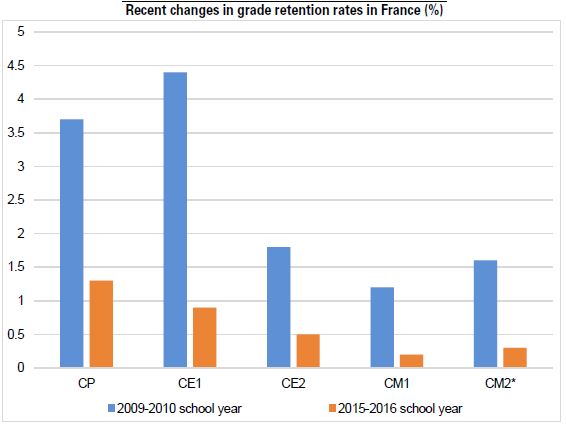Trésor-Economics No. 191 - Overcoming student difficulties at school
France has achieved four of the six objectives in the European Union's strategic framework for Education and Training 2020 (ET2020), namely: reducing the school dropout rate to below 10%, ensuring that over 40% of persons aged 30-34 have a tertiary degree, enrolling over 95% of children aged 4 to 6 in early childhood education, and providing lifelong learning for over 15% of adults.
However, in each of the three PISA assessment areas-reading, mathematics and science-slightly over 20% of students performed poorly; this percentage is higher than the OECD average and well above the European objective of 15%. The PISA assessments also find that performance by secondary school students in France has fallen since 2000. For instance, the mathematics performance mean score for France fell from 517 points in 2000 to 493 in 2015, with most of the decline occurring between 2003 and 2012. (By definition, the OECD average is 500.)
Academic failure is a major economic issue because it is associated with very high unemployment of young people with few or no educational qualifications. It must therefore be addressed either by remedial measures targeting the students in greatest difficulty, including by grade retention, or, at an earlier stage, by strengthening preventive measures.
Despite reduced recourse to grade retention since the early 1970s, France still ranked sixth among OECD countries in 2015 for the percentage of students aged 15 having repeated a grade. The 2013 Education Act ("Loi pour la refondation de l'École de la République") has amplified the reduction by providing that grade retention must be "exceptional". At the end of the 2015-2016 school year, grade retention fell below 1%, except in CP (cours préparatoire, the equivalent of 1st grade) and troisième (the equivalent of 9th grade).
This rapid decline in the use of grade retention is a positive development. Empirical evidence points to the overall lack of effectiveness of grade retention on students' performance in the medium term, as most students repeating a year would actually benefit from promotion. Further, for students with identical proficiency, grade retention primarily affects those from disadvantaged social backgrounds. Lastly, it is expensive. OECD (2013) estimates that grade retention in France for students aged 6-15 costs close to €1.5 billion in 2012.
Empirical evidence tends to indicate that the most effective remedial measures are reinforced personal tutoring, along with remedial courses during school holidays. Other preventive measures that could be tested or considered include "looping"-in which a teacher works with the same class for three years, for example, from CP to CE2 (from 1st to 3rd grade)-and more horizontal measures. For example, many empirical studies, especially in France, stress the positive impact of reduced class size on academic performance by students from disadvantaged backgrounds in the early years of schooling.
